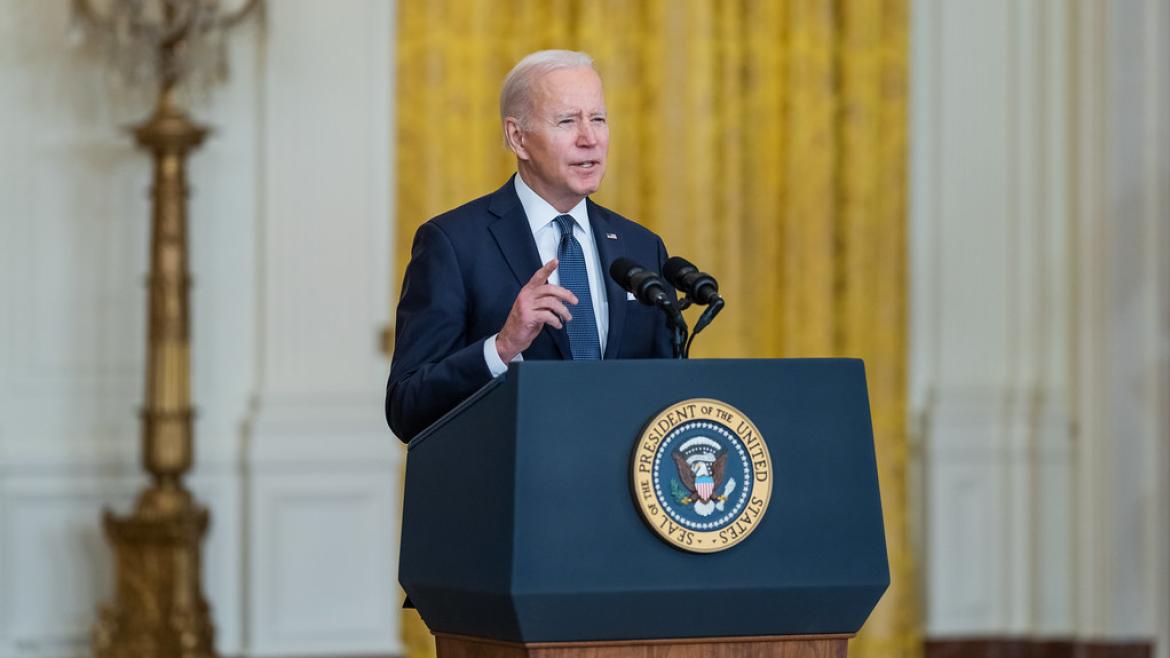On March 28, President Biden released his proposed budget for the fiscal year 2023. The President’s budget lays out the administration’s top priorities and offers a blueprint that kicks off the congressional budget process.
FCNL doesn’t support every policy decision in the President’s FY 2023 budget proposal, but we noted some important highlights. That several of FCNL’s priorities made it to the top of the White House’s agenda is a gratifying reflection of the persistent advocacy of our network and lobbyists over many months and years.
Climate Policies that Prioritize Environmental Justice
The United States has a long history of advancing policies that expose communities of color to environmental hazards. The movement for environmental justice seeks to right this imbalance, and the President’s budget follows through on the administration’s commitment to this issue. It includes critical funding to implement the Justice40 initiative—a government-wide effort to ensure that climate and clean energy investments reach disadvantaged communities. It also features funds to monitor air quality, support the transition to clean energy in low-income communities, and more.
The President’s request for international funding recognizes the U.S.’s key role in global climate leadership. Funding for the Green Climate Fund and the Clean Technology Fund is vital to helping developing nations seeking to reduce their dependence on fossil fuels and make the transition to cleaner energy sources.
Meaningful Investments to Support Families and Restore Fairness
The President’s budget signals support for Congress to enact legislation supporting families. It explicitly names expansions to the Child Tax Credit and Earned Income Tax Credit along with investments in childcare, health care, and other key priorities.
The budget promotes a fairer tax code by raising taxes on wealthy individuals and corporations. In addition to building on the tax proposals included in the House’s Build Back Better Act, the President’s budget proposes a new Billionaires Minimum Income Tax. Many of the country’s wealthiest individuals pay little or no income tax, and this proposal would ensure they pay more of their fair share.
Native American Policy in Consultation with Tribes
For the first time in U.S. history, the President’s budget process included direct consultation with tribal nations. As a result of this input, the budget features increased funding overall and, importantly, funding to stabilize the tribal healthcare system.
The document recommends $9.1 billion in funding for tribal healthcare. Significantly, it recategorizes Indian Health Service (IHS) funding as mandatory rather than discretionary spending. This means IHS funding can automatically keep pace with increasing healthcare costs and population growth. This change will close longstanding shortfalls, address backlogs and inequities, and modernize record systems.
Investments in Immigration Processing
The President’s budget responds to the enormous backlog of more than 9 million applications for citizenship by making needed investments in our nation’s immigration processes. It also includes $150 million to ensure the legal representation for adults and families in immigration court proceedings, many of whom currently navigate this complex system without any guidance, a reality that undermines our commitment to due process protections.
Funding for Justice Reform and Violence Interrupters
FCNL advocates supported the passage of the FIRST STEP Act into law, so it is encouraging to see investments in a robust justice reform agenda—including $100 million for federal workforce development in the federal prison system pursuant to the FIRST STEP Act and additional money for juvenile justice programs—included in the President’s proposal.
The budget also takes seriously the need to engage in violence prevention through public health approaches to gun violence and funding for community violence intervention initiatives. It is encouraging to see sustained support for efforts such as violence interrupter programs that work to stop violence before it starts. Money for these community-based approaches was unfortunately tied to additional dollars for traditional policing—a potentially harmful step for Black and brown communities that continue to face harm or even death at the hands of law enforcement.
Some Positive Steps for Peacebuilding
On the foreign policy side, there was welcome news in several areas. The president requested full payment of U.S. dues for UN peacekeeping and funds to begin paying off the over $1 billion in U.S. arrears resulting from an arbitrary cap imposed by Congress. His budget proposes canceling the nuclear Submarine Launched Cruise Missile program, retiring the B-83 nuclear gravity bomb, and cutting the procurement of F-35 fighter jets from 94 to 61. FCNL will be working hard to prevent Congress from reversing these gains.
What comes next?
The President’s budget is the starting point for our advocacy—not the end. Based on his proposal, the House and Senate will begin to negotiate their spending decisions and priorities for the year to come. The challenge before us is to help Congress produce a budget that will continue, and even accelerate, progress toward the world we seek.
We are encouraged by the inclusion of many of FCNL’s critical priorities in this initial spending blueprint—an important marker of the success of our long-term advocacy efforts. But we know it will require persistence to ensure these pieces move forward and are meaningfully funded this year and in years to come.


